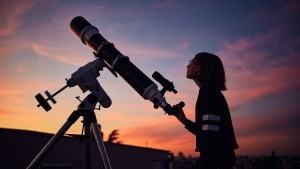On the evening of July 20, 1969, Pope Paul VI visited the Vatican Observatory, located in the pontiffs’ summer villa at Castel Gandolfo. He was welcomed by Fr. Daniel O’Connell, director of that astronomical observatory at the time. The Italian pope had gone there to follow the Apollo 11 mission’s moon landing in the best possible conditions.
Enthusiasm for the exploration of space
For several weeks, the Pontiff had made no secret of his enthusiasm for the latest developments in the space race. During the Angelus on July 13, three days before the mission’s lift-off, he called for prayers for the success of the American venture. In a visibly optimistic tone, he said, “Science fiction is becoming reality.”

Admiration for the exploration of space, he explains, allows us to reflect on the nature of man from a new angle.
“Who is this being, capable of so much? So small, so fragile, so like animals, which do not change or go beyond the limits of their natural instincts, and yet so superior, so masters of things, so conquerors of time and space? Who are we?” he asked the pilgrims gathered in St. Peter’s Square.
Watching the landing from a privileged place
On July 20, a magnificent crescent moon appeared in the Roman sky as the stage of the lunar landing was launched. From the telescope at Castel Gandolfo, the Pope watched the final approach maneuvers of Apollo 11, guided by the wise comments of Fr. O’Connell. Then, like 600 million other television viewers, he took his seat in front of a television set — a color model had been specially installed in the papal residence for the occasion.
The stages of the endeavor unfolded before his eyes: the module’s landing in the Sea of Tranquility, the descent of Neil Armstrong and then “Buzz” Aldrin, the lunar walk, and finally the unveiling of a commemorative plaque: “Here men from the planet Earth first set foot upon the moon, July 1969 A.D. We came in peace for all mankind.” In front of his screen, the pontiff couldn’t repress his expressions of wonder.
His messages to the astronauts
He immediately addressed a message of congratulations to the three American astronauts, delivered in Italian and English. In this “Moon Speech,” he marvels at the fact that the globe is no longer “an impassable limit of human existence, but a threshold open to the expanse of limitless spaces and new destinations.” The last words of his message are for the heroes of the day:
Honor, greetings and blessings to you, conquerors of the Moon, pale lamp of our nights and our dreams! Bring to her, with your living presence, the voice of the spirit, a hymn to God, our Creator and our Father.
We are close to you, with our good wishes and with our prayers. Together with the whole Catholic Church, Pope Paul the Sixth salutes you.
On the following October 16, the astronauts visited Rome and were received in an audience by the Pope. The pontiff continued to express his enthusiasm for their feat: “Man has a natural tendency to explore the unknown, to discover the mystery; but man also has a fear of the unknown. Your courage has overcome this fear, and through your intrepid adventure, man has taken another step towards a greater knowledge of the universe,” he said, waxing lyrical.





